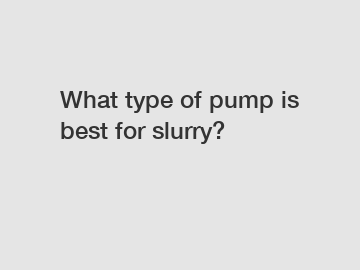What type of pump is best for slurry?
Apr. 07, 2024
Slurry Pump Selection: Finding the Best Pump for Your Needs.
Selecting the right pump for handling slurry is crucial for ensuring efficient and reliable operations in various industries such as mining, wastewater treatment, and construction. Slurries are mixtures of solid particles and liquids that can be highly abrasive and corrosive, making it essential to choose a pump that can withstand these challenging conditions. With a wide range of pump types available, it can be overwhelming to decide which one is best suited for your specific application. In this article, we will discuss the different types of pumps commonly used for slurry handling and the key factors to consider when selecting the best pump for your needs.
Centrifugal Pumps: Ideal for Handling Abrasive Slurries.

Centrifugal pumps are one of the most common types of pumps used for handling slurries due to their ability to efficiently move large volumes of fluid. These pumps work by converting rotational kinetic energy into hydrodynamic energy to pump the slurry. Centrifugal pumps are particularly effective for handling abrasive slurries with solid particles, making them a popular choice in industries such as mining and mineral processing.
Key advantages of centrifugal pumps for slurry handling include:
- High flow rates and efficient solids handling capabilities.
- Ability to handle a wide range of viscosities.
- Minimal maintenance requirements.
However, centrifugal pumps may not be suitable for highly viscous or corrosive slurries, as these factors can affect the pump's performance and require more frequent maintenance.
Positive Displacement Pumps: Ideal for Handling Viscous Slurries.
Positive displacement pumps operate by trapping a fixed amount of fluid and then forcing it into the discharge pipe. These pumps are highly effective for handling viscous slurries with high solid content, as they provide a consistent flow rate and can handle varying viscosities without losing efficiency. Positive displacement pumps are commonly used in applications where precise flow control is required, such as wastewater treatment plants and chemical processing.
Key advantages of positive displacement pumps for slurry handling include:
- Consistent flow rates and high pressure capabilities.
- Ideal for handling high viscosity fluids with solid particles.
- Can handle variable operating conditions without affecting performance.
However, positive displacement pumps may be more prone to wear and require regular maintenance to ensure optimal performance, especially when handling abrasive slurries.
Choosing the Best Pump for Your Slurry Application.
When selecting a pump for handling slurry, it is essential to consider the specific characteristics of the slurry, including particle size, viscosity, and abrasiveness. Other factors to consider include the desired flow rate, pressure requirements, and the operating conditions of the application. Consulting with a pump expert or manufacturer can help you determine the best pump type for your specific needs and ensure reliable performance.
In conclusion, selecting the right pump for handling slurry is essential for maintaining efficient operations and minimizing downtime in various industries. By considering the specific requirements of your application and understanding the advantages of different pump types, you can make an informed decision to ensure long-term reliability and performance.
If you need further assistance in selecting the best pump for your slurry application, feel free to contact us for expert advice and support. Our team of pump specialists is here to help you find the ideal solution for your specific needs.
If you are looking for more details, kindly visit metallurgy slurry pump supplier, slurry pump for electricity plant ash wholesale, dredge pump manufacturers factory.
50
0
0


Comments
All Comments (0)